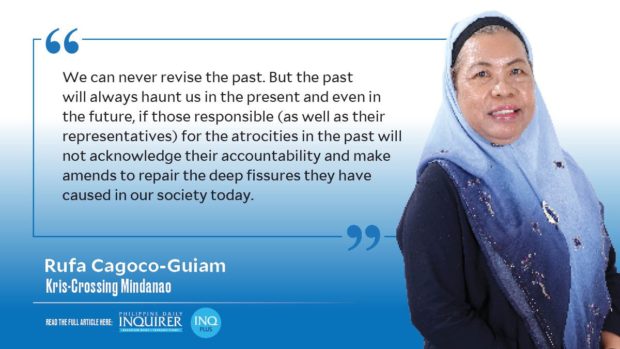‘The past is always present…’
“History cannot be restored and re-enacted. However, past injustices can be brought to light and be corrected.” This is the gist of a paper that Dr. Astrid Tuminez, former City University of Hong Kong professor and senior research associate of the United States Institute of Peace (USIP) wrote in 2008. She is now the president of the Utah Valley University in the United States, the first female of Filipino descent to be appointed such.
Tuminez’s paper, “The Past is Always Present: The Moros of Mindanao and the Quest for Peace” was published in 2008, as part of the Southeast Asia Research Centre Working Paper Series at the City University Hong Kong. The paper was the result of the research visit of Tuminez and her former USIP colleagues tasked to facilitate a series of discussions on land dispossession issues among the “Moros of Mindanao.” At that time of their visit (around 2004-2006) the Government of the Philippines (GPH) and the Moro Islamic Liberation Front (MILF) were nowhere close to signing a peace agreement from the talks that started more than a decade back (1997).
I am reminded of Tuminez’s paper while participating in a weekend workshop here in Davao City on finalizing the assessment on the normalization process.
Normalization is a key provision in the Comprehensive Agreement on the Bangsamoro (CAB) that capped long years of peace negotiations between the GPH and MILF. It was signed on March 27, 2014.
Part of the normalization annex of the 2014 CAB was the creation of a Transitional Justice and Reconciliation Commission (TJRC) that had a specific mandate to conduct studies and policy interviews focusing on four major issues that spawned the Bangsamoro armed struggle to assert their right to self-determination. These issues were legitimate grievances, historical injustices, marginalization through land dispossession, and human rights violations. A fifth study area, on how to move on from the violent past toward healing and reconciliation among communities deeply divided by conflict, was also included in the TJRC mandated tasks.
Our workshop discussions included the denial of the Bangsamoro distinctiveness as a people and of the countless historical injustices and numerous violations of their human rights by the forces of the Philippine state. In 2015, these narratives were shared in the community listening processes that TJRC conducted in 211 conflict-affected areas in Mindanao.
Supporters of Ferdinand “Bongbong” Marcos Jr. and of the Marcos family in general have been pushing for a revision of the past, to clear the elder Marcos of accountability in the plunder of government funds, and the looting of several valuable paintings, among others. In the 2019 elections, then candidate for senator Imee Marcos repeatedly told victims of martial law atrocities associated with her father to just “move on,” and forget the past.
Now Bongbong is running for president, and among his supporters’ claims is that his father is the best president the Philippines ever had. This claim wipes out the truths of torture of dissident student leaders as well as of many Bangsamoro activists demanding for a meaningful self-rule in their homeland, not to mention his and his wife’s plunder of national coffers.
The veracity of the Jabidah Massacre in 1968 in Corregidor island has also been questioned. But the massacre of Tausug youth was the foundational narrative that launched the Bangsamoro struggle for their right to self-determination through the organization of two major Moro rebel groups: the Moro National Liberation Front and the MILF. Denying the truth of this massacre is questioning the Philippine national government’s decision to engage the two fronts in the long and tedious peace processes.
We can never revise the past. But the past will always haunt us in the present and even in the future, if those responsible (as well as their representatives) for the atrocities in the past will not acknowledge their accountability and make amends to repair the deep fissures they have caused in our society today.
—————-
Comments to rcguiam@gmail.com





















